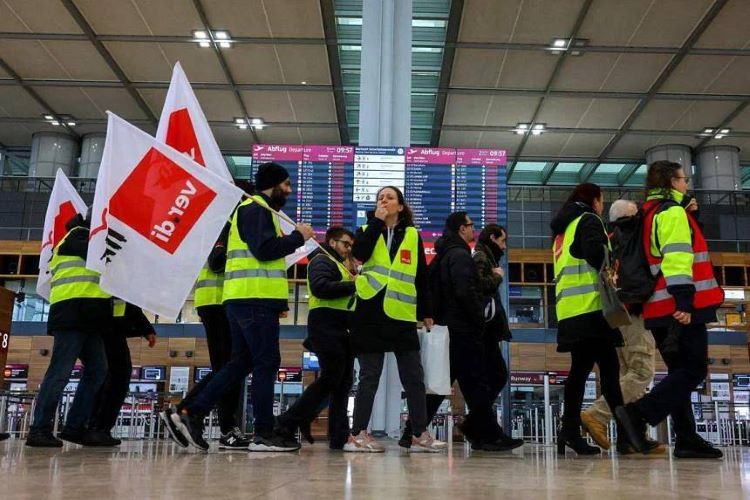
 Germany’s unions put the brakes on travel nationwide on Monday as thousands of workers in airports, railways and elsewhere walked off the job over pay disputes.
Germany’s unions put the brakes on travel nationwide on Monday as thousands of workers in airports, railways and elsewhere walked off the job over pay disputes.
At Frankfurt Airport, Germany’s largest, there was no regular passenger service.
Some 1,170 departures and landings transporting about 160,000 travellers were expected on Monday.
Public transport in much of Germany came to a halt at midnight in a 24-hour strike, alongside almost all airports, railways, waterways, motorways and local public transport.
They were all affected, in seven of the country’s 16 states.
“There are no passengers en route,” said a spokeswoman for the Munich airport’s traffic management.
All the 785 scheduled flights were cancelled on Monday.
“Nothing is taking off or landing. It’s almost a bit spooky,” she said.
Berlin’s BER airport was not included in the strike, but all domestic flights were cancelled, as were those at Leipzig/Halle and Dresden to the south.
Most other airports reported flight cancellations.
On the railroads, more than 30,000 workers alone were participating in the walkout, according to the EVG railway union.
“The willingness to strike is very high, and the anger among the workers over being stalled by the employers is huge,” said EVG negotiating committee member Kristian Loroch.
The rail worker walkout had international effects, as it halted cross-border rail travel to the neighbouring Czech Republic, the Czech state railroad Ceske Drahy (CD) reported.
Eurocity trains between Prague and Berlin ran only on the section between Prague and Decin.
Eurocity trains bound for Munich ended in Domazlice.
German rail operator Deutsche Bahn criticised the strikes, saying they hurt millions.
“Millions of passengers who rely on buses and trains are suffering from this excessive, overblown strike.
“Not everyone can work remotely,” a Deutsche Bahn spokesman said.
German Interior Minister Nancy Faeser said she has a lot of understanding for travellers who were angry over the lack of transport services due to the strike.
The railway spokesman noted that thousands of companies in the economy that received or shipped their goods by rail would also suffer.
“The winners of the day are the oil companies,” he said.
But the country’s leading motorists’ group, ADAC, said the strikes had so far not caused traffic chaos in cities and on motorways.
Most commuters and travellers adjusted well to the nationwide walkout, according to traffic experts.
Only a few major traffic jams were reported by the police in the morning.
“Those who can, have stayed at home,” ADAC said.
Union activists, like strikers in many European countries hit by high levels of inflation amid rapidly rising energy prices, are pushing for higher wages in the transport sector.
For the 2.5 million federal and municipal employees, the trade union Verdi and the civil servants’ association dbb were demanding 10.5 percent more income.






















